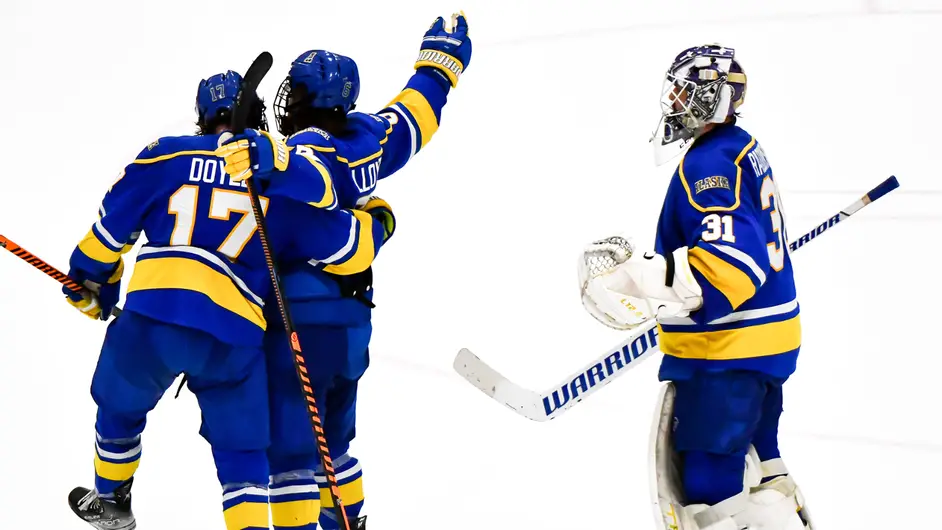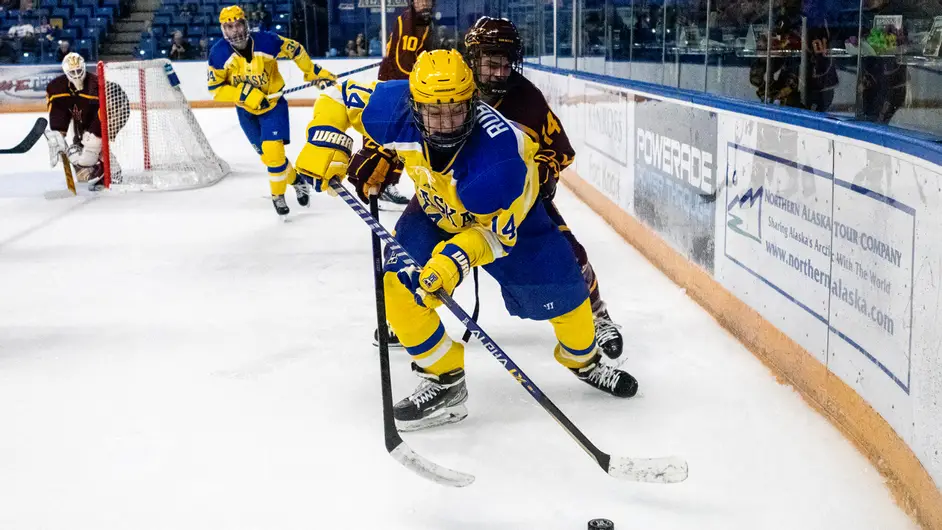
Fans can (and do!) argue endlessly about which team has the country’s toughest schedule.
And while the Pairwise, RPI and KRACH have largely rendered these discussions moot (there’s math involved!) what’s not up for dispute of this: No team in college hockey has it tougher travel-wise than the Alaska Nanooks.
Just take a gander at this late-season swing: The Nanooks played Arizona State in Fairbanks for a Friday-Saturday series before leaving three days later for New York, where they played two afternoon games at an NHL practice rink in Long Island on a Friday and Saturday, only take another redeye back to Fairbanks in order to play the exact same team twice more. Then they hop on another plane to play Arizona State once again before returning to Fairbanks one final time to play Lindenwood in their final games of the regular season.
Ah, the glamorous life of an NCAA hockey independent. Playing on the road so often, and being without a conference as the Nanooks are, can be tough on the bodies and the minds. But despite this, head coach Erik Largen says there are also benefits to being away from home so much.
“Sometimes being on the road and being away from some of those things and just being with your teammates ends up being a benefit,” Largen said last week. “Sometimes the travel can be a little tough with the distance and things like that, but overall I think our guys play pretty well on the road. They eat well, they sleep well and should be prepared to play on a given weekend.”
If playing on the road so much troubles the Nanooks, it’s certainly not showing in their play. At 16-10-2 overall, Alaska has played themselves into the conversation of an at-large bid to the NCAA tournament. Although those hopes took a bit of a hit this past weekend when the team split with LIU, it’s still mathematically possible for the Nanooks provided they win the rest of their six games and have a lot of help from teams around the country. The Nanooks are currently No. 19 in the Pairwise rankings.
“If somebody said they weren’t looking at that, they’d be lying,” Largen said. “We all want to keep playing, we all want an opportunity to play in the national tournament, play in the national championship. We know that every game is so important for us. We don’t have the luxury to play in a conference tournament. (These games are) critical. We have to do a pretty darned good job, and we have some tough opponents on the schedule.”
If the Nanooks did get a bid, it would be the first time an independent team received a bid to the tournament since 2019 when Arizona State made it. Before that was in the early 1990s when UAF’s rival Alaska Anchorage made it as an independent from 1990 to 1992.
“We play Long Island this weekend, and we know if we lose two games that dream’s just about done,” Largen said last week before the road portion of the extended four-game home-and-home. The Nanooks didn’t lose two – they won 5-3 on Friday but lost 3-1 to the Sharks on Saturday – so there’s almost certainly no chance of the Nanooks making it if they lose again. “We have to take care of what we can control, and that’s just playing the best we can in these last games and being as prepared as possible.
“If we can take care of business and have a good finish, you never know what could happen at the end of the year.”
Regardless of how the end of the season plays out, the Nanooks likely surprised some people with their overall resume and the wins they’ve been able to get. They beat Denver, Omaha and Notre Dame – all on the road – and have only been swept twice this season, by Michigan Tech and Penn State.
“Against Penn State, I felt like we played really good hockey,” Largen said. “We didn’t maybe get rewarded with wins but that second night I thought we outplayed them and probably deserved a better fate,” Largen said. “It was good to see we weren’t just reliant on goaltending or special teams. I think our game on 5-on-5 has really evolved. Fast forward a month or so and we got a chance to play Notre Dame and Denver, and we felt like we played really good hockey in all four of those games.
“Getting a split in those places is not the easiest thing to do, so we’re starting to see that we can play with anyone in the country.”
The Nanooks were a passable 14-18-2 a season ago, but considering they were not able to play at all during the COVID-shortened 2020-21 season and lost many key players because of it, their resurgence as an independent is all the more impressive. Largen pointed to Max Newton, who left for Merrimack was one of Hockey East’s top scorers a year ago, and Chris Jandric, who transferred to North Dakota and currently leads the NCHC in scoring for defenseman.
Largen isn’t going to play the what-if game, though: His current team is plenty good, too. A trio of sophomores – Payton Matsui, Brady Risk and Chase Dubois – are leading the team in scoring, and a couple of transfers – forward Johnny Sorenson from Minnesota and goaltender Matt Radomsky from Holy Cross – have helped propel the program forward.

“That ’19-20 year, we had home ice and lost to a pretty good Bowling Green team that year, and I thought we could maybe make another pretty good run at it and I thought we were set up for a good year. That COVID year made us take a step back, but as we got into the second half of that 20-21 season, I thought we were playing good hockey and were getting some good results with it. From a program perspective, that hasn’t taken a dip. I just feel like Alaska’s a great place to play, we have fantastic facilities and great support and that hasn’t changed from COVID.”
The biggest challenge? Playing without a conference. Hence why the Nanooks are playing just 13 home games as opposed to 21 on the road. And why they have played rivals Alaska Anchorage six times.
With six independent programs out there playing right now, Largen said games against all these teams have become nearly as important as they would be if they were in a league like the old WCHA.
Largen said there have been discussions about possibly forming an official conference with the remaining independents. In the past, those discussions didn’t get very far because the NCAA was thinking about putting a hold on the formation of single-sport conferences, but it appears that is no longer the case.
“If there’s a way for us to get an AQ, it’s a no-brainer, because I think there are some good teams and I think it would help elevate everybody’s programs,” Largen said. “Obviously there are hurdles with that, but I think it’s possible.
“I know now everyone is very inward-looking, which is understandable with COVID and costs and the state of NCAA athletics, but it would be nice to have a conference that welcomes newcomers and maybe encourages expansion and maybe allow some teams to know they have a landing spot and a built-in schedule right off the bat.”
For now, though, the Nanooks will have to play the schedule in front of them: Six games against fellow independents that might not “mean” much for the other programs but are huge for the Nanooks’ shot at the NCAAs. Largen, however, dismissed the talk of “meaningless” games.
“Last year, we didn’t necessarily have anything to play for, but our guys played so hard against all these teams,” he said. “When you drop the puck, the game’s the game, and guys are going to play hard. Guys are excited to play the game, regardless of what’s on the line. These guys love playing, and whether you’re 1-31 or 31-1, you’re still going to be playing hard these last few games of the year.
“At the same time, it’s great to play meaningful hockey this time of year. There’s only so many teams that get a chance to make the tournament through an at-large bid, and for us to still be playing for that is a good accomplishment. But we’d love the ability to finish strong and give ourselves the best opportunity to do that.”


